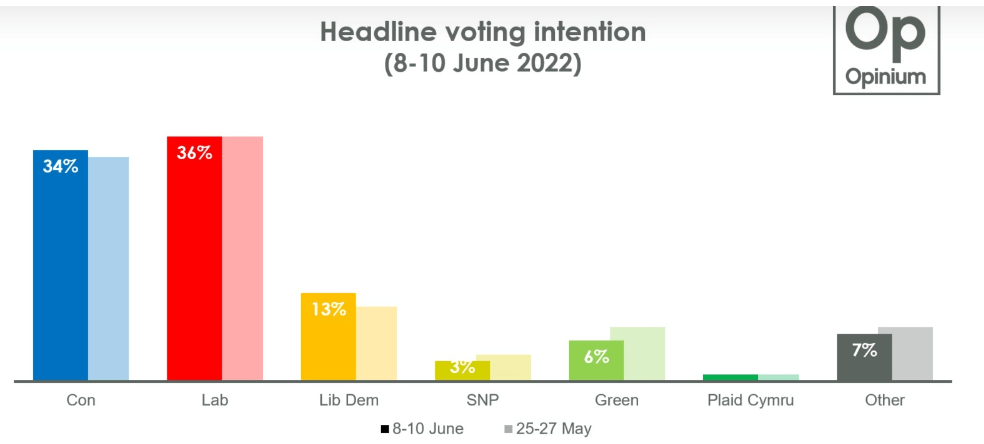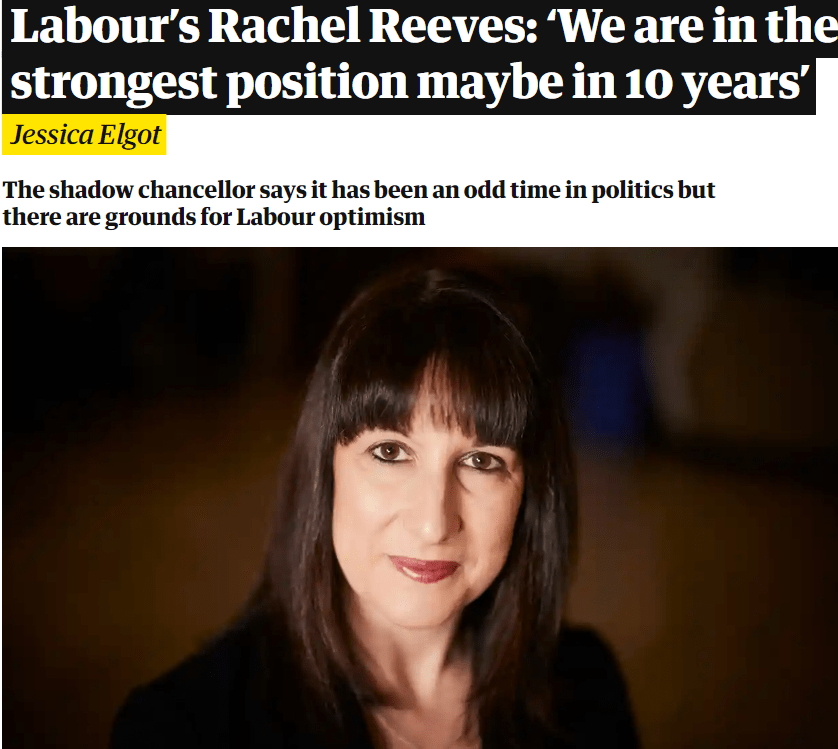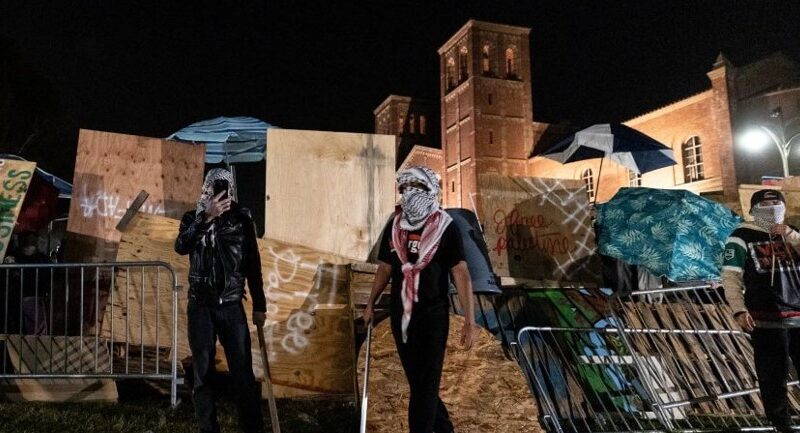Astonishingly, despite serial lying about Downing Street parties, the biggest cuts in living standards for a generation, 40 per cent of his own MPs wanting him out, and all of his vacuous bombast, a poll shows Boris Johnson is thought to be a better potential PM than Keir Starmer.
An Opinium poll published in yesterday’s Observer, shows that Johnson’s approval ratings has actually improved by three points, although still in negative territory, at -27. Starmer’s own personal rating, according to Opinium, at -6, is unchanged from an earlier poll.
But when asked who would make the best Prime Minister, 28 per cent said Johnson, and only 26 per cent said Starmer. There is only one reasonable explanation for this apparent absurdity, and that is that Keir Starmer has so little to offer that he is seen as being no better than the Tory leader.

In terms of voting intention, Labour leads in the Opinium poll, but only by two percentage points, and that less than in the previous poll. The worst and most corrupt government in modern times has the good fortune to be faced with the most inept and spineless opposition in modern times. Labour Party members should be asking, with everything that is going on, why isn’t Labour twenty points ahead in the polls?
Many unions and groups of workers are planning industrial action
Above all, it is a question that has a concrete meaning for the trade union wing of the labour movement. Pushed by their members facing rocketing food, energy, housing and other costs, many trade unions are either planning industrial action – like the RMT’s planned national rail strikes – or they are balloting for action. Teachers, civil servants, local authority workers, Royal Mail, transport workers and many others in the private sector are demanding that their pay be kept up with inflation.
Official inflation might be around 9 per cent, but the cost of food, fuel and housing – all costs that bear down proportionally more on the lower paid – are rising at a rate well over double figures. Even child care, not normally considered a major spend, is consuming a larger proportion of household costs. According to a survey by the TUC, (Guardian, June 13) 32% of households with young children are paying as much as a third of their disposable income in child-care costs. This compares with an average of 14% in France and only 1% in Germany.
Johnson and other Tory ministers have condemned unions like the RMT that are demanding decent pay rises for their members. Grant Shapps has even threatened new anti-trade union laws, effectively making any successful strike an impossibility.
Without using so many words, what they are saying is that workers should meekly accept a cut in their living standards – this from the party who argued during the last general election campaign that austerity was ‘over’. But threats from Tory ministers will not hold back the tide. Many sections of workers will be taking action this Summer and Autumn in defence of their living standards.
The dilemma facing the Labour leadership is how to react to a Summer of Discontent. They have so far reserved all of their indignation and fighting spirit for the ongoing assault on the left of their own party, and their opposition to the Tories has been pitifully weak.
Labour leadership like rabbits caught in headlights
Faced with workers defending their living standards by strike action, the Labour leadership are like rabbits caught in headlights – trapped by the hard reality of life faced by the very people they want to vote for them. Trying to appease big business and showing themselves to be ‘responsible’, while at the same time not wishing to be too blunt about not supporting workers going on strike, the Labour leadership is between a rock and a hard place.

Like Neil Kinnock in the 1980s, who refused to support the miners’ strike, the natural instinct of Keir Starmer is to oppose strike actions in every case. But various shadow ministers have been forced, albeit in the usual, half-hearted, weaselly manner, to reflect the pressure of workers who are – quite reasonably – demanding decent wages.
Even the leadership of the main trade union backer of Keir Starmer, UNISON, is being forced by the pressure of the membership to fight for decent rises. Speaking in an interview with the Financial Times, UNISON General Secretary, Christina McAnea, explained, “Care workers who were having to hold the hands of dying patients because the families couldn’t get to them . . . for [the government] to say, you need to show pay restraint, is completely inappropriate.”
“We don’t want to bring our low-paid workers out to strike”, she added, “but if there’s no alternative what else can people do?” Keir Starmer please note.
“Some 25,000 Unison members working in schools are balloting for strike action in Scotland this week”, the Financial Times article pointed out, “Meanwhile Unison with the GMB and Unite unions have submitted a joint submission to local government for a pay rise for 1.4mn council and school workers of either £2,000 or keeping pace with retail price index inflation — which is generally higher than the consumer price inflation rate…”
Workers increasingly faced with bills that cannot be paid
There is not a uniform mood among workers at the present time. Apart from those immediately taking strike action, many are deeply concerned for the future. Insecurities and uncertainties have multiplied very suddenly, almost without warning, and are growing by the day. Faced with bills that cannot be paid, food prices that cannot be met, and petrol tanks that cannot be filled, many workers are still unsure which way to turn.
Even the response to next weekend’s TUC demonstration (“we demand better”) has been more muted than it was for previous national demonstrations. That has a lot to do with the fact that the leadership of the TUC and many of the big unions are ‘talking the talk’, but otherwise sitting on their hands.

Nevertheless, at some point, the fear that is holding many workers back will turn to anger and loathing. Two consecutive days of demonstrations in Peckham, South London, involving thousands of local residents, led to the release of two locals arrested on immigration charges last weekend. The police were utterly incapable of dealing with the massive and largely spontaneous crowds that formed.
On a small and localised scale, what happened in Peckham is the music of the future. A hurricane is coming, and if the Labour leadership try to stand aside from it, it will bring down a storm of opposition on their heads from within the labour movement itself. It could lead to a leadership challenge or it could put a question mark against the relationship between Labour and the unions. To one degree or another, it will affect the balance of forces in the party and it will not be to the benefit of the right wing.
All the fine plans of the right, in ‘taking back control’ of the Labour Party, expelling the left, isolating Corbyn and watering down policies, are coming up against the hard reality of a capitalist system in crisis. The current Labour leadership has nothing to offer workers.
While the leadership will strain might and main to defend an economic system that is inevitably based on the impoverishment of workers, it will be the aspirations of those same workers to defend what they have and even fight for something better that will be the undoing the leadership.



